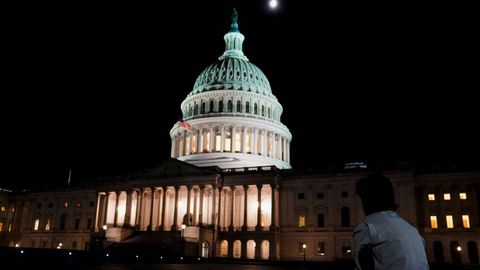
Nighttime image of the exterior of the US Capitol NATHAN HOWARD | Reuters
The agreement reached contains concessions from Democrats, but maintains “key priorities” of the government, according to Biden
The White House and Republicans reached an “agreement in principle” this Saturday that raise the debt ceiling and prevent the United States from entering into a suspension of payments, the President confirmed Joe Biden and the head of the House of Representatives, kevin mccarthy.
“I just spoke with the president. After wasting time and refusing to negotiate for months, we have reached an agreement in principle that is worthy of the American people,” McCarthy said in a message on social media. Minutes later, in a brief appearance before reporters, the Republican assured that the agreement includes a “historical” reduction of public spending and reforms that will “lift people out of poverty and into the workforce.” He also pointed out that it does not contain new taxes or new government programs.
“We still have a lot of work to do tonight to finish the entire text” of the agreement, warned the Republican leader in Congress, who did not want to answer questions from reporters because he first wanted to tell his party’s lawmakers to pre-negotiate the details, he said.
McCarthy said lawmakers will continue drafting legislation tonight. After that, he will consult with the White House, talk to Biden “tomorrow afternoon” before releasing the text to be voted on on Wednesday, the 31st.
An hour after McCarthy’s appearance, President Biden released a statement in which he acknowledged that the principle of the deal contained concessions by Democrats, but stood by your government’s “key priorities”.. “The agreement represents a compromise, which means that not everyone gets what they want. It is the government’s responsibility,” he said.
However, he added, the deal “protects” his “key priorities” and the “legislative accomplishments of Democrats in Congress.” “It is an important step forward that reduces consumption protecting critical programs for workers and growing the economy for all,” Biden added.
The president confirmed that the negotiating teams of both parties have the task of finalizing the legal text that will be voted on by both the House of Representatives (controlled by the Republicans) and the Senate (controlled by the Democrats). “I strongly urge both chambers to adopt the agreement immediately,” he concluded.
The tentative deal comes a day after Treasury Secretary Janet Yellen updated her estimate of the June 5 deadline after which the country could face bankruptcy.
The debt limit is the total amount of money the United States Government is authorized to borrow to meet its existing legal obligations to pay Social Security and Health Care benefits, military pay, interest on the national debt, tax refunds, and other payments.
From time to time, the United States looks at defaulting on the national debt for, unlike other countries, the Government can only issue debt up to a limit fixed by Congress, which has power to raise that upper limit as it sees fit.
The country hit its legal debt limit of $31.4 trillion on January 19, prompting the Treasury Department to resort to emergency measures to pay the bills since then.
When the deal is finalized and approved by the House, it will end a period of sharp confrontation between Democrats and Republicans, who have tried unsuccessfully for months to reconcile positions on the issue.
Biden has been open to concessions in recent months, accusing “MAGA Republicans in Congress,” referring to the party’s most radical lawmakers who follow former President Donald Trump (2017-2021), of threatening the country’s progress with lawsuits. “totally” unacceptable. However, negotiations have intensified in recent weeks, with the deadline approaching, prompting President Biden to return ahead of his trip to Japan for the G7 summit.
Institutions such as the Federal Reserve (Fed) have been warning these months about the risks of not raising the debt ceiling. Failure to do so, its president, Jerome Powell, recently warned, “would be unprecedented” and “we would be in uncharted territory” whose consequences “would be very uncertain.”
International organizations such as the International Monetary Fund (IMF) have also warned of the urgent need for Congress to act because failure to do so will have “serious consequences” for both the US economy and globally.
Source: La Vozde Galicia
I am Amelia James, a passionate journalist with a deep-rooted interest in current affairs. I have more than five years of experience in the media industry, working both as an author and editor for 24 Instant News. My main focus lies in international news, particularly regional conflicts and political issues around the world.







